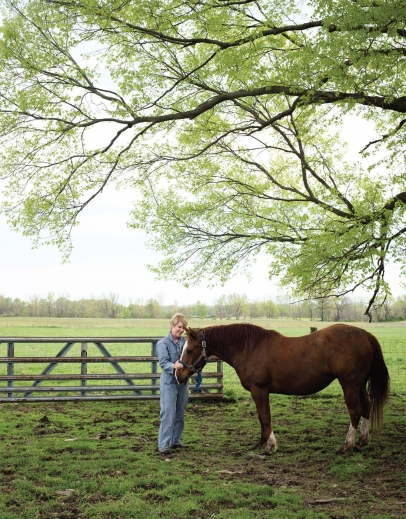DOROTHY PELANDA
A Q&A with the Ohio Department of Agriculture’s first female director
In January, Dorothy Pelanda was appointed the 39th director of the Ohio Department of Agriculture (ODA) by Governor Mike DeWine. She is the first woman to serve as director in the department’s more than 150-year history.
A native of Union County, Pelanda still lives on the Marysville farmland where she was raised. She practiced law for nearly 30 years, and from 2011 to 2018 she served as a legislator in the Ohio House of Representatives.
On a recent morning, Pelanda moved with ease among the livestock on Harrison Farm in Groveport, Ohio. Kind and comfortable, it was obvious that agriculture runs deep in her veins. While at the farm, she sat down with us for a conversation to discuss her priorities as ODA director, her thoughts on women in the industry and her vision for Ohio’s agricultural future.
Tell our readers about your agenda priorities and what you’ve heard from farmers as you dive into your new role at ODA.
My first priority has been to travel the state to have conversations with farmers in all of Ohio’s 88 counties about the issues that are important to them. Governor DeWine has established water quality improvement as a priority for his administration. [He has proposed substantial funding] to address water quality issues in all of Ohio’s counties. One of the most important things that I have discussed with farmers is what the water quality issues are in their neck of the woods. The number one thing I’ve learned in traveling the state is that there is no silver bullet, or single solution, to solving water quality or water management issues.
A common refrain I’ve heard from farmers is that soil tests need to be more uniform. At ODA, we’re going to create what we call an “EOB”—or explanation of benefits, like on a medical bill—for soil testing. Currently, soil test results are very complicated to read. We’re working to create an EOB for soil tests to better explain results and offer highlights. We’re going to work to make the tests more uniform, more understandable and more affordable.
We’ve also been hearing a lot of feedback on nutrient management plans in our meetings with farmers. Mainly, that the plans are expensive, difficult to manage and require too much accompanying documentation. We are working with various experts and professionals to create an online, expedited application program in line with soil testing that will require much less documentation and that will be affordable.
The money that ODA will be given from Governor De-Wine’s water quality improvement budget will also be used to hire new people through soil and water conservation districts to go door-to-door to talk to farmers about soil testing and nutrient management plans. With the funding, we’ll also work with farmers on manure management programs and conservation efforts like cover crops and buffer strips. We’ll address equipment needs and incentivize farmers who are undertaking innovative conservation practices. I believe the way we are going to measure success is through the number of acres and the number of farms that sign up to engage in these programs.
What other initiatives are on the horizon under your lead at ODA?
I cannot fail to mention Ohio Senate Bill 57, which proposed, for the first time in a long time, legalizing the production of hemp in Ohio. [Editor’s note: At press time legislative action on this bill was still pending.] Hemp is a perfect crop for farmers who want to diversify or for beginning farmers. Senate Bill 57 would authorize the Director of Agriculture to promulgate rules and regulations surrounding the cultivation of hemp and the processing of its byproducts, including CBD oil.
In anticipation of the law passing, we are traveling the nation, visiting states that already have hemp through a pilot program in the 2014 Farm Bill to see what they are doing, the successes they’ve had, the modifications they would suggest so that our team is ready to go back to the legislature to ask for the monies we need for the scientists, the equipment and the space to begin this exciting new industry.
Another issue of interest to Governor DeWine is the fact that children often do not know where their food comes from or how it is processed. To address this, we have hired a deputy director to lead food and children’s initiatives for our department. The focus on children has become a common goal for all agencies and farm-to-school is a great way for ODA to support Ohio children.
I’ve talked with schools and they say that farm-to-school presents challenges in terms of what they can serve and what they cannot. Our goal is to take those challenges away. Think about how that direct connection will help change the relationship between farmers and the general public and the relationship between farmers and a child who may consider agriculture as a career because of the things they experienced in school during those very formative years.
What’s an important aspect of agriculture in Ohio that you’d like to stress to readers of our magazine?
I think the public has a lot of misconceptions about farmers. Farmers care about water quality and conservation. They want clean water too.
A farmer told me recently, “I look at the challenges we are facing, and I welcome them.” Food and agriculture, I believe, has remained the number one industry in Ohio because farmers continue to be innovative.
I also believe that agriculture is about human relationships, not science or data. It’s human relations when it comes to a family’s desire to keep farming, when we’re talking about connecting neighbor-to-neighbor, farm-to-farm and within a community. I always stress that the most important thing farmers can do is reach out and build relationships within their communities to tell their stories.
What are your thoughts about being the first woman to serve as the director of ODA?
Growing up, both my mother and my father taught me that I could do anything that I wanted. My mother wanted her girls to be very resourceful. She taught us to sew as soon as our feet could touch the foot pedal. She also taught us to do millinery and to cook because she wanted us to be self-sufficient.
Both of my parents enabled me to be resourceful and independent, which is what I would hope for every child, girl or boy, as they grow up. I hope that they can look at the world as full of endless opportunity. I hope my appointment is an example for every youth, boy or girl, that you can do anything you want to do.
What is your favorite summer fruit or vegetable and how do you like to prepare it?
Tomatoes and peaches. There’s nothing better than a fresh tomato from the garden and eating it right in the field with salt. I have a tomato zucchini recipe with cheese that is a favorite in my family. And, of course, I love a caprese salad with tomatoes and Ohio cheese. I also have a frozen peach dessert recipe that’s incredible. There’s nothing better than peaches with a scoop of ice cream.




